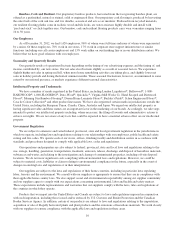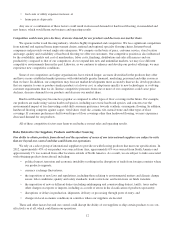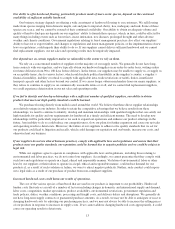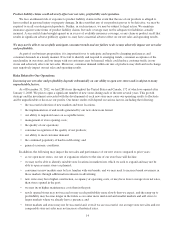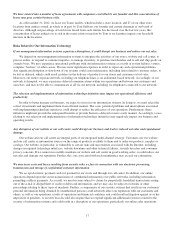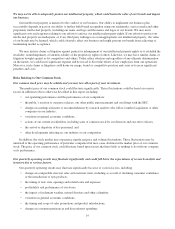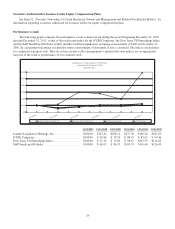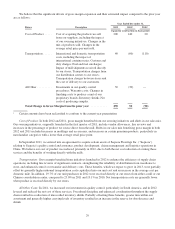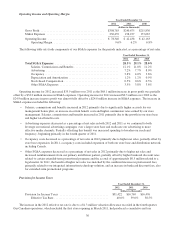Lumber Liquidators 2012 Annual Report Download - page 26
Download and view the complete annual report
Please find page 26 of the 2012 Lumber Liquidators annual report below. You can navigate through the pages in the report by either clicking on the pages listed below, or by using the keyword search tool below to find specific information within the annual report.• fluctuations in supply prices; and
• tax expenses, impairment charges and other non-operating costs.
Due to these factors, results for any one quarter are not necessarily indicative of results to be expected for any other
quarter or for any year. Average store net sales or comparable store net sales in any particular future period may decrease. In
the future, operating results may fall below the expectations of research analysts and investors, which could cause the price
of our common stock to fall.
Tom Sullivan has the ability to exercise influence over us and his interests in our business may be different than yours.
At December 31, 2012, Tom controlled approximately 3% of our outstanding common stock. Accordingly, he is able to
exercise influence over our business policies and affairs and all matters requiring a stockholders’ vote. Tom’s interests may
conflict with yours, and he may seek to cause us to take courses of action that, in his judgment, could enhance his investment
in us, but which might involve risks to holders of our common stock or be harmful to our business or other investors. In
addition, the timing and volume of any transactions involving our common stock by Tom may, among other things, cause
fluctuations in the price of our common stock.
Our anti-takeover defense provisions may cause our common stock to trade at market prices lower than it might absent
such provisions.
Our certificate of incorporation and bylaws contain several provisions that may make it more difficult or expensive for a
third party to acquire control of us without the approval of our board of directors. These provisions include a staggered
board, the availability of “blank check” preferred stock, provisions restricting stockholders from calling a special meeting of
stockholders or requiring one to be called or from taking action by written consent and provisions that set forth advance
notice procedures for stockholders’ nominations of directors and proposals of topics for consideration at meetings of
stockholders. Our certificate of incorporation also provides that Section 203 of the Delaware General Corporation Law,
which relates to business combinations with interested stockholders, applies to us. These provisions may delay, prevent or
deter a merger, acquisition, tender offer, proxy contest or other transaction that might otherwise result in our stockholders
receiving a premium over the market price for their common stock. In addition, these provisions may cause our common
stock to trade at a market price lower than it might absent such provisions.
Risk Related to Accounting Standards
Changes in accounting standards and subjective assumptions, estimates and judgments by management related to
complex accounting matters could significantly affect our financial results.
Generally accepted accounting principles and related accounting pronouncements, implementation guidelines and
interpretations with regard to a wide range of matters that are relevant to our business, including but not limited to, revenue
recognition, stock-based compensation, lease accounting, sales returns reserves, inventories, self-insurance, income taxes,
unclaimed property laws and litigation, are highly complex and involve many subjective assumptions, estimates and
judgments by our management. Changes in these rules or their interpretation or changes in underlying assumptions, estimates
or judgments by our management could significantly change our reported or expected financial performance.
Item 1B. Unresolved Staff Comments.
None.
20


